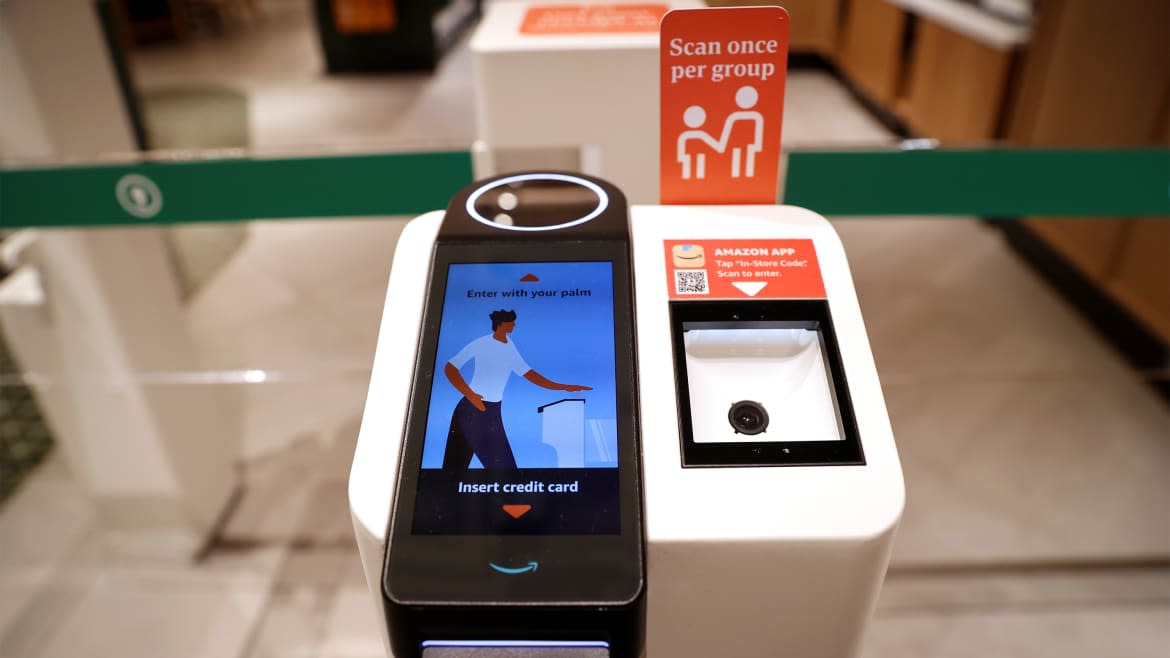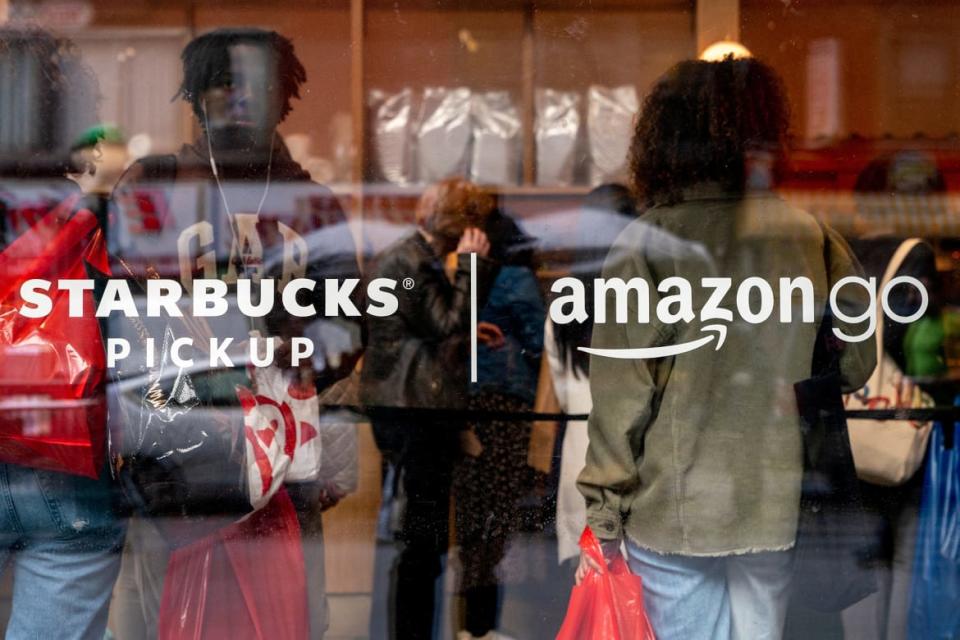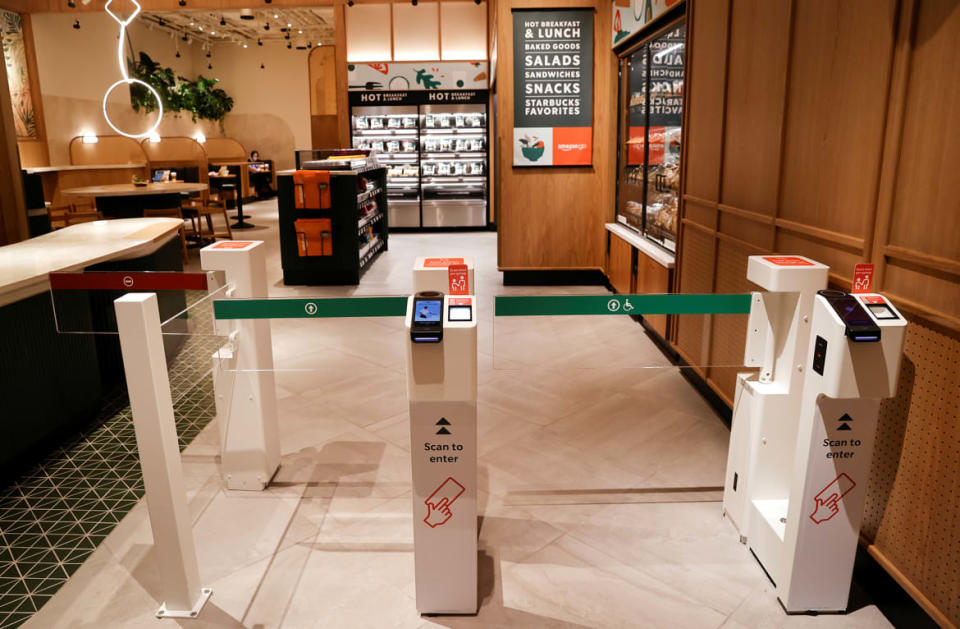Amazon’s ‘Just Walk Out’ Tech Is a Privacy Nightmare

Amazon and Starbucks are teaming up. Combination Starbucks Pick Up and Amazon Go stores are popping up across New York City. The idea is to walk in, grab your coffee, a book, and whatever other convenience item you like, and simply walk out. No payment necessary.
Of course, you do pay. It’s just that in this sci-fi scenario, you get “frictionless checkout”: it happens on your phone and you never even push a button. You “just walk out,” the name of the technology Amazon patented to make these stores possible.
There’s a hidden price you pay, too: Amazon takes a biometric picture of your skeleton; and either a scan or your palm, credit card, or an Amazon code in order to identify you with your account so it knows whom to charge. Amazon and Starbucks say these stores will reduce lines, increase convenience, and help people move through their days quickly. But they will do much more than that, and it’s not good.
AI Won’t Just Replace TV and Movie Writers—It Will Make Pop Culture a Nightmare
Amazon’s “Just Walk Out” technology pairs new AI techniques with lots of sensors in the stores, which gather data on where you are, how long you’re there, and which products you’re picking up. Just Walk Out is already being introduced at major sports stadiums, which means that you will probably walk through its scanners and AI portals for a game or a concert in the near future. Crowd control is about to get personal in this way, too. Underneath the convenience is something truly dystopian: Amazon is harvesting biometric data and sharing it with Starbucks. At least, that’s what a lawsuit against the companies alleges. It turns out that this “convenience” is against the law.
The lawsuit was filed by STOP, the Surveillance Technology Oversight Project, along with the law firm Peter Romer-Friedman Law. STOP was instrumental in passing a new local law, passed by the New York City council in 2021, that prohibits biometric data gathering without consent, and more broadly prevents the sale of that data for profit (this is illegal even with consent). The Amazon Go stores, the suit alleges, failed to give prominent notice to consumers at least until March of 2023, and are sharing data with Starbucks to enrich themselves, both illegal under the law. The combination of these two allegations demonstrates how big data platforms like Amazon are undermining both privacy and democracy in one fell swoop.

Starbucks/Amazon-Go convenience store near Times Square on Nov. 1, 2022.
When you enter an Amazon Go store, sensors create a “digital skeleton” of your body, so that they can distinguish you from other customers. These unique identifiers are used to track you, and the problem of where that tracking device goes once you leave the store makes this a much larger concern than any “convenience” it promises. The usual promises that data will not be shared or stored ring hollow here, as the lawsuit alleges that both are occurring, and it’s not clear how anonymity can be preserved when the goal of the technology is to create a unique biometric profile to track individuals and their movements.
Albert Cahn, the executive director of STOP, described this type of surveillance as a “force multiplier for those who use it.” He told me that surveillance of this kind must be outlawed, as “companies are taking our data first, and coming up with justifications for it second.” Facial recognition technologies are already in widespread use in both the private and public sectors, he reported. The New York Police Department has access to more than 30,000 cameras through a program called the Domain Awareness system. He described Amazon’s and Starbucks’ alleged violations of the law as “brazen” and “alarming,” and argued that biometric surveillance is “uniquely poised to threaten New Yorkers’ civil rights and make it impossible to go about any part of our day without being subjected to dystopian and discriminatory technologies.”
The law requires a sign in the window that notifies customers of the tracking. But the privacy concerns go far beyond what a sign could do. Co-counsel in the lawsuit, Peter Romer-Friedman, told me he has asked countless people how they think such a store would work, and “almost no one” could tell him. The most common guess was that phones are being tracked, but people have little idea that they are identified in an irrevocable way with a digital bio-scan. Romer-Friedman pointed out that Congress is far behind on these issues, but local and state governments are stepping up, with Illinois and Washington state passing laws about the gathering and trade of biometric data. But privacy isn’t the only concern.

The entrance turnstiles of a new Starbucks store, its first-ever in partnership with Amazon Go that lets customers check out without a cashier.
Starbucks employees at the Times Square location are attempting to unionize, claiming that Amazon signed the deal, walked away, and saddled the Starbucks workers two jobs for the price of one. It’s easy to see how Just Walk Out is a labor-saving technology for these companies. After all, no clerks are scanning items. “That entire job has been eliminated,” said Romer-Friedman. Some jobs remain, of course, but workers are reporting terrible treatment. The technology enables “anti-worker policies,” Romer-Friedman continued,” and “raise questions about how much surveillance we want to tolerate as a society,” because “the workers who are least able to demand fair working conditions are the ones to whom surveillance will be most applied.” In other words, Just Walk Out technologies immiserate workers and subject consumers to unprecedented surveillance. This two-sided effect betrays the very core of what platforms promised us as they rose to corporate power over the last twenty years.
Amazon was a risky project that a hedge fund vice president named Jeff Bezos started in the 1990s. But its goal was never just to sell books. Bezos wanted data. Once there was enough data, the platform emerged as a way to connect buyers and sellers more generally. Amazon.com is a marketplace, just like a farmer’s market but on a grand scale. But because it has so much data, including your purchase history, it can recommend things to you. The promise of the platform is personalization. You get to what you want quicker, and the seller makes his sale quicker too. So long as the personal details are all digital and encrypted, we’ve decided collectively that that’s OK. Sure, we’ve already traded some privacy in this model, but that’s nothing compared to what happens in the brick-and-mortar platform that Just Walk Out makes possible.
Just Walk Out presents a new phase in what business professor Shoshana Zuboff calls “surveillance capitalism.” According to Zuboff, Google and others have used data to profit not just from sales but also from our behavior since the early 2000s. Just Walk Out goes even further, tracking not just behavioral data, but bodies. We’ve gone from personalization to identification, from digital data to biometric tracking. Amazon and other platforms promised us better options, faster, at cheaper prices. But they’re destroying human rights that are far more fundamental than how quickly you can get a mocha latte. “Move fast and break things,” Mark Zuckerberg’s infamous motto, is increasingly being applied to the democratic freedoms that make market economics possible in the first place.
And Just Walk Out is only the beginning. A larger trend is visible now. Observers have questioned why convenience stores like Walgreens would replace transparent glass in their drinks section with digital screens. The answer is that a camera placed above the display reads your facial expression, determining your demographics. If you’re a white male, maybe you want a Monster Energy drink. Hot day? Grab an iced coffee. Sweating from a workout? Here’s a Gatorade. These algorithms now have the potential to identify you, and perhaps even read your mood, realizing our worst sci-fi fantasies. No workers are required. The trend promises to make stores into artificially intelligent vending machines.
Twitter Reaches $150 Million Settlement Over Claims That It Improperly Used User Data
This goes well beyond bringing sellers and buyers into a “smart” marketplace, increasing convenience, and reducing “friction.” It completely upends the buzz we heard not so long ago about how Big Data would “reinvent capitalism” with its sophisticated “matchmaking algorithms.” Not that long ago, more information was better information, according to the talking heads of the digital economy. It turns out it’s only better for the platforms themselves.
Because the largest platforms have such a massive amount of data, they have a large incumbency advantage that suppresses competition, as Federal Trade Commission chairwoman Lina Khan has previously argued. When they bring the power of that data into the physical world in these new stores, they threaten something we have not seen yet, a kind of total privatized surveillance state in which jobs are reduced and untenable. The use of biometric data in retail effectively destroys the rights of both workers and consumers. Rather than make markets smarter and better, Just Walk Out and similar technologies threaten to destroy the very democratic freedoms that make markets function in the first place.
Maybe we should just take a cue from Amazon and “just walk out”—simply stop patronizing these stores. But you have to work to survive in our society, and you don’t always have much choice about where to get coffee (Starbucks has a whopping 350 locations in New York City alone) or everyday necessities. The fantasy of “choice” that free-market fundamentalists maintain is quickly becoming laughable, as a surveillance web closes over workers and consumers alike. Rather than “just walking out,” we’re going to have to stop these techniques in their tracks if we want our human rights to survive the AI-powered era of the platform.
Get the Daily Beast's biggest scoops and scandals delivered right to your inbox. Sign up now.
Stay informed and gain unlimited access to the Daily Beast's unmatched reporting. Subscribe now.

